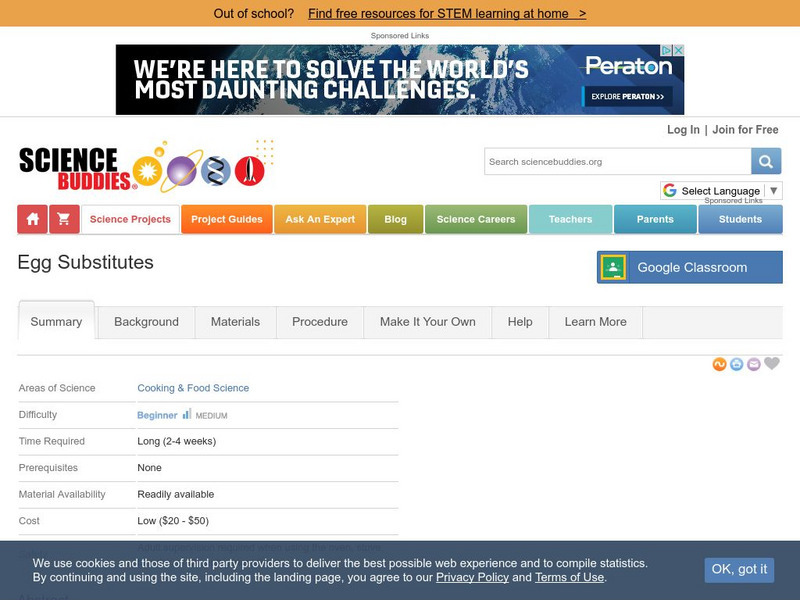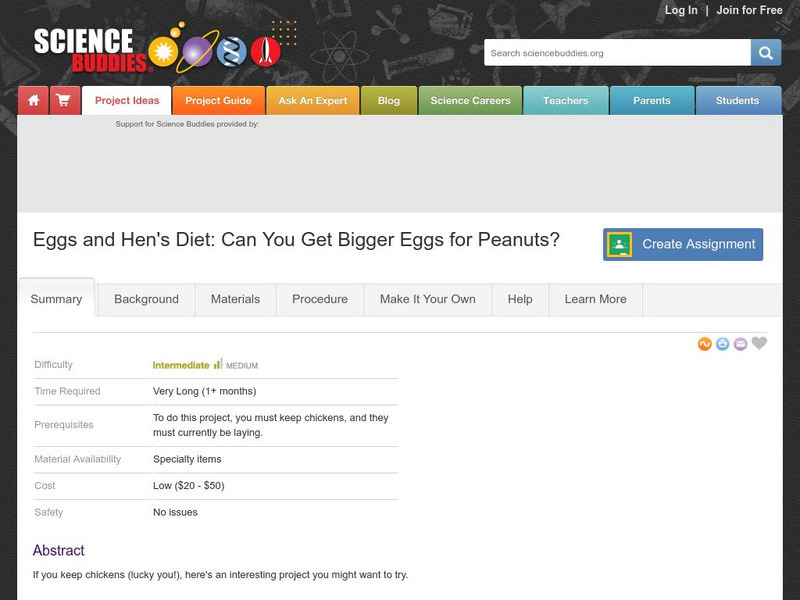Hi, what do you want to do?
Teach Engineering
Egg-cellent Landing
The classic egg-drop experiment gets a new bounce with an activity that asks pairs to design a lander similar to one used to land a rover on Mars within a fixed budget. The activity provides a great introduction to the idea of...
Curated OER
Where is the Science?: Design as an Introduction to the Scientific Method
Students work to create a design that will protect an egg from being dropped from a one story floor. They test their prototype after it is completed. They write clear instructions and link aspects of the design process to the scientific...
Intel
Plugging into the Sun
What's cooking? A sizzling STEM unit challenges scholars to build a solar cooker that can successfully cook an egg. The unit opens with a study of Earth's rotation, the sun's energy, and shadows. Pupils use a compass and thermometer to...
Curated OER
Hatching Chickens
Learners understand the process of how an egg hatches. In this hatching eggs lesson, students care for eggs and chickens while the eggs are hatching. Learners observe the hatching process and relate to other animals and humans.
NC Cooperative Extension, Guilford County Center
Life Cycle Of Painted Lady Butterflies
The Very Hungry Caterpillar is the inspiration for this project-based learning activity. Kindergartners create a lifecycle chart for a butterfly with four sections: egg, caterpillar, pupa, and butterfly. It is a three-dimensional...
Curated OER
Language Arts/Science: Genetic Diseases Simulation
Eighth graders engage inn role-playing activities as families caring for babies with genetic defects. A partial list of activities include: dressing the babies ( raw eggs), designing birth certificates, and recording a log of care,...
Curated OER
Hatching Chickens
Students consider the concept that much can be learned from the natural world by observation. They observe the incubation and hatching of chicken eggs in the classroom and discuss the needs of living things.
Virginia Department of Education
Biotechnological Issues and Bioethics
Culminate a bioethics unit with the implementation of a lesson that incorporates the Socratic method to encourage class feedback and participation. Pupils participate in a discussion on bioethics and morality, complete a...
Curated OER
Hatching Chickens
Students explain the importance of carefully observing and caring for eggs and chickens in the classroom.
Curated OER
Embryological Development Using Medaka Fish
High schoolers analyze and record major events that occur in the development of Medaka fish eggs from fertilization to hatching. In small group, students describe the processes involved, creating a timeline of the major events in the...
Curated OER
Hatching Chickens
Students observe and care for eggs and chickens. For this life cycles lesson, students recall facts about chickens and how they hatch. Students read the article Hatching Eggs in the Classroom and observe the life cycle of the chicken in...
Houghton Mifflin Harcourt
That’s Amazing!: Challenge Activities (Theme 3)
Synonym dominoes, anyone? As part of the activities designed for kids who have mastered the basic concepts in the Houghton Mifflin Harcourt thematic unit That's Amazing! kids are offered a variety of activities that include...
Curated OER
Hatching Chickens
Students observe how chickens hatch. In this life cycles lesson, students read the book Hatching Eggs: A Step by Step Guide and use an incubator to hatch the eggs. Students observe the chicks hatching and take care of the chicks by...
Curated OER
Earth Day
Students complete a variety of Earth Day activities. In this recycling and the environment lesson, students listen to Earth friendly music, create a car out of juice boxes, use soda cans and bottle caps to create a Halloween...
Curated OER
Non-Newtonian Fluids
Young scholars will use water, cornstarch, eggs, and more to explore the different states of matter. They will make observations of an unknown substance called "Oobleck" and test its liquid and solid properties. This would be a great...
Curated OER
Where Does Food Come From?
Students recognize that food we eat comes from farms. In this where does food come from lesson, students discuss planting crops and how they grow. Students plant seeds for edible crops and eat them when are ripe. Students...
Curated OER
Leprechaun Traps Using Simple Machines
Are you looking for a fun way to incorporate St. Patrick's Day into your science curriculum? Try designing and building leprechaun traps!
Curated OER
How Does a Butterfly Grow?
Students explore the stages of a butterfly. They read and discuss the book, The Very Hungry Caterpillar, by Eric Carle. They draw a picture of their favorite part and create a graph. They write a letter to Eric Carle and observe a...
Curated OER
The Great Rock Sort
Students describe and sort rocks according to their physical properties. They listen to a story and discuss what they know about rocks, then work with a partner to discuss how their sample rocks differ from each other.
Curated OER
A Toast To The Past
Students analyze, and research the identity of the non electric toaster as a historical artifact. In this toaster lesson plan, students then create a visual timeline of toaster history.
Curated OER
Frogs, Fabulous Frogs
Learners have the opportunity to both interpret and replicate the different shapes and textures observed in the life cycle of a frog. When students apply the watercolor wash to the crayon texture rubbings the designs take on a...
Other
Chemistry Science Fair Ideas
A descriptive list of chemistry-oriented ideas that answer such questions as: Have you ever wondered what happens inside of an egg when it is hardboiled? How do products like Bounce act to soften clothes after they are washed and dried?...
Science Buddies
Science Buddies: Egg Substitutes
Egg allergies are not uncommon, therefore many egg substitutes are sold in order to bake, and cook recipes that call for them. In this science project idea, you'll investigate how to modify recipes so that even egg-allergic friends and...
Science Buddies
Science Buddies: Eggs and Hen's Diet: Can You Get Bigger Eggs for Peanuts?
The goal of this project is to determine whether feeding chickens a dietary supplement of peanuts will result in larger and heavier eggs. If peanuts do increase egg size, a secondary goal will be to determine the optimal amount of peanut...




























